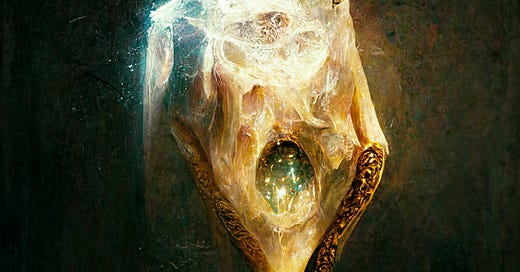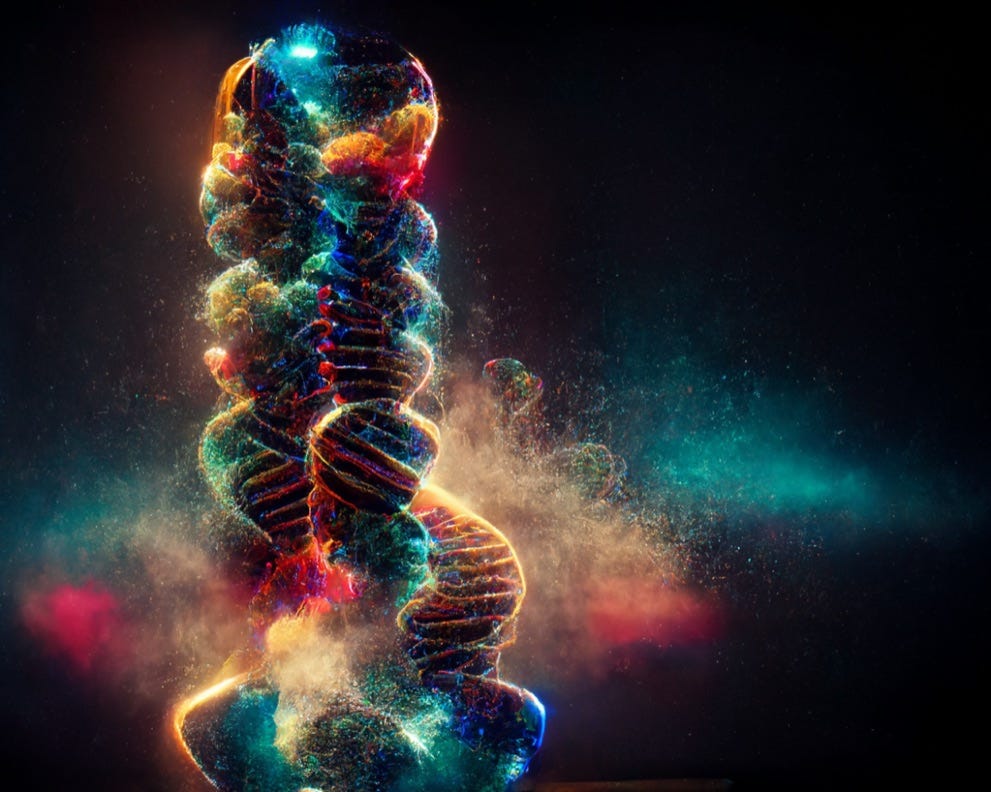Any sufficiently advanced technology is indistinguishable from magic—Arthur C. Clarke
I want to believe that there’s something more in there, that your “passion for technology” might actually be driven by a youthful desire to create magic on Earth, that one day a giant bearded man will come and tell you “you’re a wizard, Harry!” (or whatever your name is) and the real life adventure you’d been looking will start.
Yeah, I grew up reading, watching, and obsessing over the Harry Potter saga. Though my Hogwarts acceptance letter has been late by 7 years, the Magical World of Biotech called at my door (or rather my YouTube feed) a couple of years ago.
In this “fairy essay”, I make the case for why Harry Potter, by J.K. Rowling (a non-biologist), is really the intimate story of the Selfish gene, a term coined by the one and only Richard Dawkins. This essay is far from technical, rather philosophical, and I hope more than one of you enjoys the magic! 🧬✨🧙
1. Desire and immortality
Naval Ravikant would describe desire is a contract with yourself to be unhappy until you get what you want. Okay, I just really want to know where it comes from. Is it 100% mimetic? Is it our evolved DNA telling us what to do so we survive long enough, reproduce, and maintain its immortality? Hmmm… 🤔
Well, we can start by remembering that Lord Voldemort (or Tom Riddle) was quite an ambitious person, as would be expected of any member of the Slytherin house. His greatest endeavor was to reach immortality. To do that, he needed to divide his soul into as many fragmentes as he could. To divide his soul, he needed to do what the wizarding world and I think is the greatest atrocity ever: murder.
That’s how the story really starts. Voldemort goes on killing people and dividing his soul, keeping it inside objects called horcruxes. Soon, he found out about a prophecy of a boy who could be his perdition so he decides he will kill him and his parents. What Voldemort didn’t expect is the mother’s love to be so big and genuine to protect the little boy from the curse—of course Lily, you already passed on your genes, so go on and sacrifice yourself to protect the lil boy, we don’t need you anymore! 😏
Please correct me if I make any misinterpretations but in Dawkins’ eyes, we aare just carriers; complex systems with 2 only tasks: 1) to make as many more copies of our DNA as we can and 2) to make that DNA better at making more copies of itself. Or as Siddartha Mukherjee would put it in his book The Gene: an egg is a means to making a better egg. “The gene” is immortal.
And so we could say that Voldemort is that gene: immortal, fragmented across a plethora of units that call themselves living things, manipulating them to keep on doing whatever it takes to keep it (the gene) alive.
2. The curse of the horcrux
Indeed, whenever someone interacts with a horcrux for too long, they start going insane. Isn’t this what genes make us do? It’s already mainstream to say that we’re wired to think like monkeys: flight at the rhythm of our amygdala, fight in the name of our pituitary gland, and f*ck whenever our hypothalamus just feels like doing it.
The gene wants this so badly it’s created things like cortisol and dopamine and oxytocin, and what not. The curse, I believe, is that these are precisely the things that stand in our way to our immortality but keep our genes relatively untouched (let’s remember that just as Voldemort, The Gene is ambitious and wants to evolve too).
In that sense, could we see death simply as part of the mechanism of evolution? In Harry Potter, someone needs to die in order to create a horcrux…
Isn’t it hard to evolve though? Most of us inherit horcruxes from our parents (and others close to us) that we’re not even aware of until a certain age. Living too close for too long, the default is to imitate each other’s behavior entirely. The Gene doesn’t seem to foster independent thinking.
Harry Potter and the order of the Phoenix is my favorite one. It tells the story of an adolescent Harry who starts manifesting the part of Voldemort that stayed inside of him when he was almost murdered. As a 15-year old, he starts to feel the weight of the horcrux he carries. He rages against it, against his thoughts, or what we as muggles see as the “monkey brain”.
3. Breaking the spell
It is our choices that show what we truly are, far from our abilities—Albus Dumbledore (from Harry Potter)
Despite being “predetermined” to become a member of the notorious Slytherin house, Harry chose Gryffindor. True, he most likely did it out of mimetic desire since he happened to be near Ron Weasley before choosing, but still we can see throughout the movie how Potter chose to be a rather good wizard.
I believe that him fighting against the demons of Voldemort, and having the bravery to confront him face to face is an inspiring depiction of how we can choose to destroy the horcruxes inside of us; that we can be more, way more, than the sum of our genes.
Still a question itches me: why does DNA “want” to replicate so badly? My favorite hypothesis so far is found in Ray Kurzweil’s book The Singularity is Near: the universe is the ultimate evolution machine, awakening itself in each iteration; having gone from atoms to conscious beings like us, who are perhaps, nothing more than seeds of a larger and utterly beautiful tree.
This to me is the antidote to the darkness some have seen in our dark Darwinian heritage. And it goes further: the joy of being conscious human beings is that we rise above our origins. Our misfiring selfish genes mean we don’t ape the lastingness of nature but extract ourselves from it and live by our values—Richard Dawkins.







